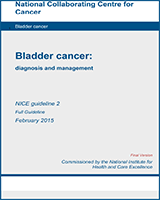From: 5, Managing locally advanced or metastatic bladder cancer

Bladder Cancer: Diagnosis and Management.
NICE Guideline, No. 2.
National Collaborating Centre for Cancer (UK).
London: National Institute for Health and Care Excellence (NICE); 2015 Feb.
Copyright © National Collaborating Centre for Cancer.
NCBI Bookshelf. A service of the National Library of Medicine, National Institutes of Health.